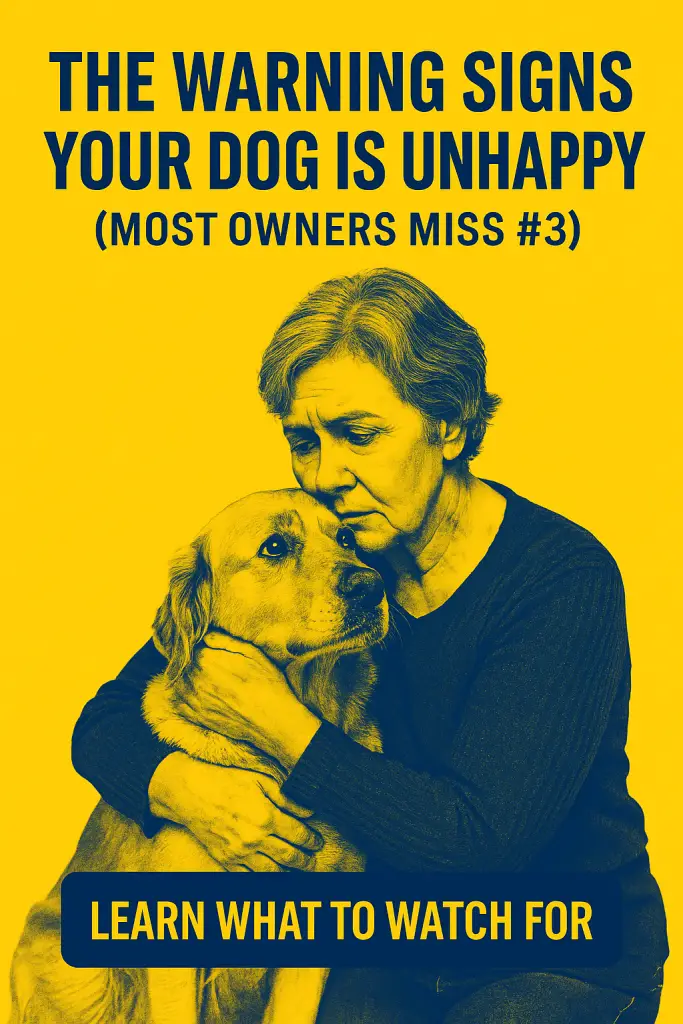
Most of us would do anything to make our dogs happy. We feed them, walk them, spoil them with treats, and give them plenty of love.
But sometimes, even when you think you’re doing everything right, your dog might be quietly telling you that something’s wrong.
Dogs can’t speak, so they show how they feel in ways that are easy to miss—especially as they get older or their habits change.
Let’s talk about those little warning signs, including one that most owners don’t even realize. If you spot these early, you can help your dog feel their best again.
1. Sudden Changes in Appetite
If your dog usually jumps up for dinner but starts picking at food or not finishing their bowl, it’s not just picky eating.
- Could be feeling sad, bored, or even sick
- Might ignore treats they once loved
- Sometimes, stress can shut down their appetite
Don’t just wait and hope it goes away—changes in eating are one of the first clues.
2. Hiding or Avoiding Family Members
Has your dog started spending more time alone? Hiding under beds, in corners, or avoiding you or other pets can mean something’s up.
- Could be feeling anxious, scared, or depressed
- Sometimes, pain or discomfort makes dogs hide
If your once-social dog turns into a recluse, don’t ignore it.
3. Less Tail Wagging and Fewer “Happy” Behaviors
(Most owners miss this one!)
Everyone loves a wagging tail. But sometimes, when a dog’s unhappy, that tail slows down—or stops wagging as much.
You might think, “She’s just tired” or “He’s getting older,” but a quiet tail (and less play-bowing, zoomies, or excitement when you come home) can be sadness peeking through.
Table: Happy vs. Unhappy Dog Behaviors
| Behavior | Happy Dog | Unhappy Dog |
|---|---|---|
| Tail movement | Wags high and wide | Slow, low, or still |
| Greeting at door | Runs up excitedly | Hangs back or ignores |
| Playtime | Brings toys, playful | Disinterested, withdraws |
| Face expressions | Soft, relaxed eyes | Staring, tense, squinty |
4. Changes in Sleeping Habits
Every dog loves a nap. But if your dog is sleeping way more than usual, or has trouble settling down, it’s worth paying attention.
- Oversleeping can be a sign of boredom or sadness
- Restless sleep might mean anxiety or discomfort
Track their sleep for a few days and see if something’s off.
5. Licking, Chewing, or Scratching More Than Usual
Dogs lick themselves, but excessive licking or chewing (especially on their paws) can signal stress or unhappiness.
- May also scratch at doors or beds
- Over-grooming sometimes leads to bald spots
If you see this, check for allergies or skin issues too, but don’t ignore the emotional side.
6. Unusual Aggression or Grumpiness
Is your sweet dog suddenly snapping, growling, or getting snippy over food or toys?
- Mood swings can mean pain, fear, or stress
- Older dogs sometimes get crankier if they don’t feel right
It’s not “bad behavior”—it’s communication.
7. Ignoring Favorite Activities
Did your dog use to beg for walks or love fetch, but now barely reacts? Losing interest in favorite things is a big red flag.
- Could be emotional or medical
- Happens a lot with older dogs, but not always normal
Time for a check-up and a little extra attention.
How to Help When Your Dog Seems Unhappy
You know your dog better than anyone. Trust your gut—if something feels “off,” it probably is.
Steps to take:
- Schedule a vet visit to rule out illness or pain
- Spend extra time playing, walking, or just sitting together
- Stick to routines; dogs love predictability
- Offer new toys or gentle challenges (puzzle feeders, treat hunts)
- If you’re stressed, they’ll feel it too—try relaxing together
Final Thoughts
Dogs try so hard to make us happy, and sometimes we just need to pay closer attention to their little signals.
Missing the warning signs doesn’t make you a bad owner—most people miss them at first! The important thing is, now you know what to look for.
Give your dog a scratch behind the ears today, and let them know you’re paying attention. Sometimes, that’s all they really want.